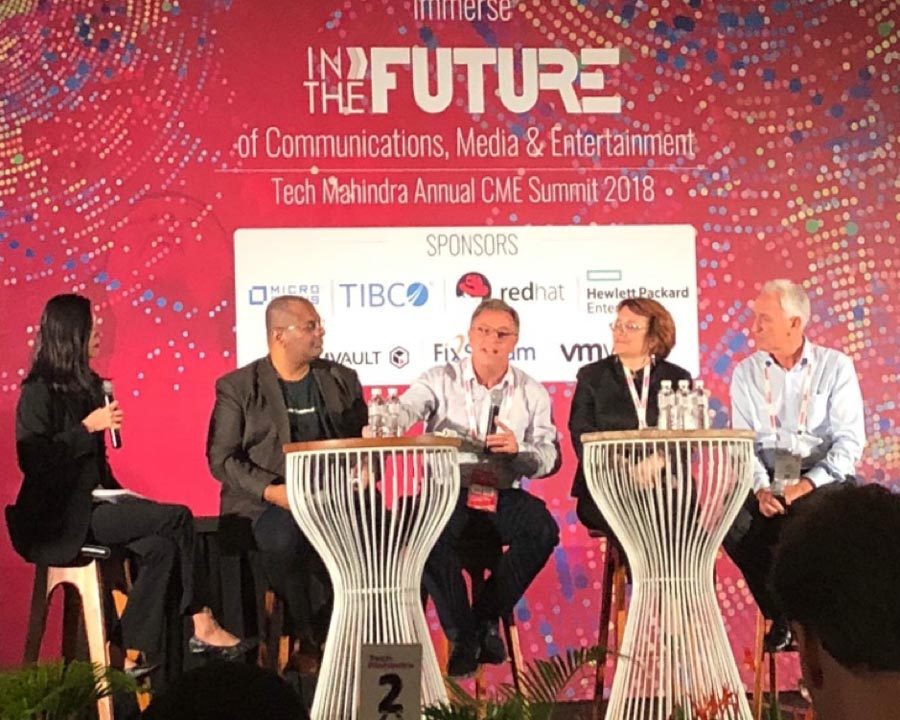By: Paul Whybrow –
Creativity has been a passion throughout my career, from my early days as a young wide-eyed BBC (British Broadcasting Corporation) producer, and spanned my media career across Seven, Fairfax Media and Foxtel.
I have loved the challenge and excitement of being the one who likes to think differently in any situation: creating an emotional connection with audiences, either through making a TV promo for a TV show, producing video for online news or leading the team bringing ‘red button’ interactive TV to Foxtel.
Any role that requires any sense of repetition or efficiency is going or gone, but any role that revolves around people management, communication and creativity is still protected.
Like many people, I had the view that creativity is a set of skills or artic abilities that are totally devoted to the arts, TV, film making, design and advertising.
Now for me, creative is taking on a whole new meaning, and one that is going to be super relevant for all of us in the workforce in the coming years. We all understand that disruption is the new norm: consumers are requiring a personalised experience that is everything for them. In this Advanced Digital Economy with machine learning, endless access to behavioural data, almost universal global access to knowledge and the steady rise of artificial intelligence there is one key ingredient that all this needs to make business better – and that is creative leadership skills and thinking.
Creative Leadership is defined as leadership which encourages, captures and cultivates atypical imaginative solutions and strategies which produce uncommon results that often ignite and refine an organisation. Deloitte Economics found that these soft skills of critical thinking, creativity and communication are 21st century skills that will give you a huge advantage. They predict that these ‘soft skill intensive jobs’ will grow 2.5 times faster than other jobs.
As Anthony Hourigan (CEO of Hourigan International, a global leadership search and selection company) puts it, creativity leadership is fundamentally changing the role of marketers. “Any role that requires any sense of repetition or efficiency is going or gone, but any role that revolves around people management, communication and creativity is still protected.” Marketers have a key role in reshaping this environment
All this sounds good in theory, but in practical terms, what does it all mean. In short, I see five big reasons why these ‘soft skills’ will give a creative leadership edge that will help you drive personal and business success.
1. THE ADVANCE DIGITAL ECONOMY IS DISRUPTING US ALL
Change is occurring across all industries as consumers demand engagement and services whenever they want, wherever they want and increasingly on whatever device they want. In this environment whether working in the social, physical or virtual world, the ability to listen to needs, connect with customers, colleagues and suppliers and collaborate across increasingly complex organisations will need top notch use of soft skills. As we all work in more matrix environments, navigating those successfully needs different approaches.
2. EXPERIENCE IS EVERYTHING
No longer is it just about selling products and services. The emerging consumers are driven by the complete experience they receive with a brand, from initial awareness through discovery, purchase and long term enjoyment. For example, a weekend away is no longer a few days’ break from work, it is 48 hours to experience the best set of activities a location can offer, from shopping through to food and fun with friends, all researched, evaluated, shared socially and reviewed for others to sample. All this focus on experience-building needs constant people-centric design and thinking which again is driven by creative skills and leadership by those wanting to constantly adapt their offering to the ever demanding and fickle consumer.
3. ARTIFICIAL INTELLIGENCE WILL MEAN CRITICAL AND CREATIVE THINKING IS AT A PREMIUM
Predictions on how many jobs will change or disappear through machine learning and artificial intelligence vary enormously. Some experts predict doom and gloom for many jobs we have today whilst others see optimism through newly-created creatively driven jobs we can’t imagine. Whatever emerges, we will increasingly rely on technology to not only do physical tasks but to do many thinking tasks too. Critical and creative thinking will be abilities needed to drive how we use AI to deliver the experiences consumers desire and the organisations equipped to compete. The combination of smart thinking and people focussed empathy is what will stand out.
4. BIG DATA NEEDS BIG THINKERS
With access to more and more data across every aspect of the supply chain and consumer experience creation chain there is the ability to be overwhelmed with all the knowledge and options. What will increasingly become a premium is thinking differently about how to interpret and react to insights to create a competitive edge. In a global market, picking up on small sentiment change and then adapting and marketing that effectively could make very rapid improvements across multiple markets. The creative thinker will have a strong edge in this environment.
5. BEING MESSY GIVES SPARK AND RESILIENCE IN A NEAT WORLD
In the world in which I grew up, the neat well-organised corporate environment was the supreme goal, to have well-structured organisations with defined lines of command and processes that were driven by constant efficiency improvements. In the disrupted digital era we are now in, that thinking is simply not enabling the messy innovation or creativity that the start-up tech businesses are able to. As incumbents adapt rapidly to compete they are likely to find that they need the messy imperfect thinking to make the disrupting moves to help them thrive. As mentioned in Tim Harford’s book, Messy, those that can collaborate effectively with those outside their normal circle will be terrific at both bridging and bonding people and ideas to create and implement plans that are very different and ground breaking.
Whether you see yourself as a natural creative thinker or not, creative leadership skills are ones that we will all want to spend time gaining expertise in. They are no longer a nice to have, but increasingly will become essential in the tool kit of marketers in order to master the market disruptions heading our way.





